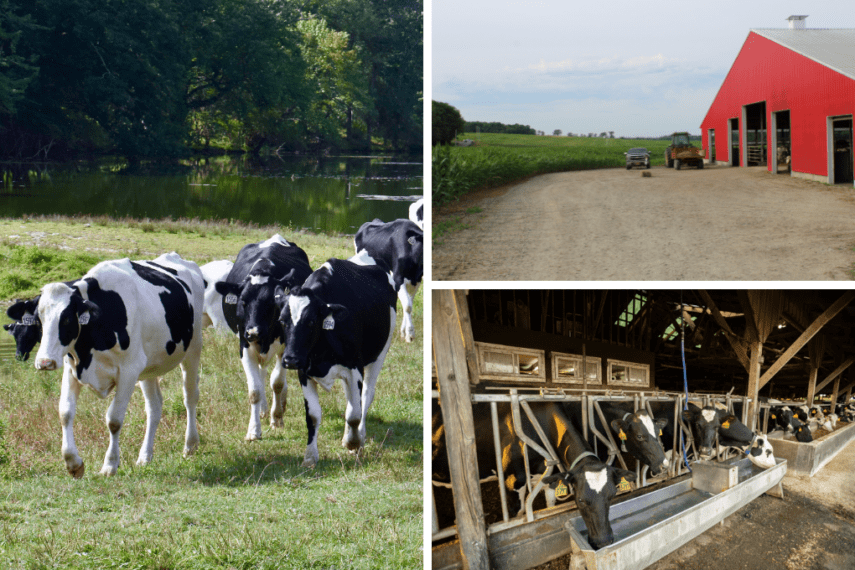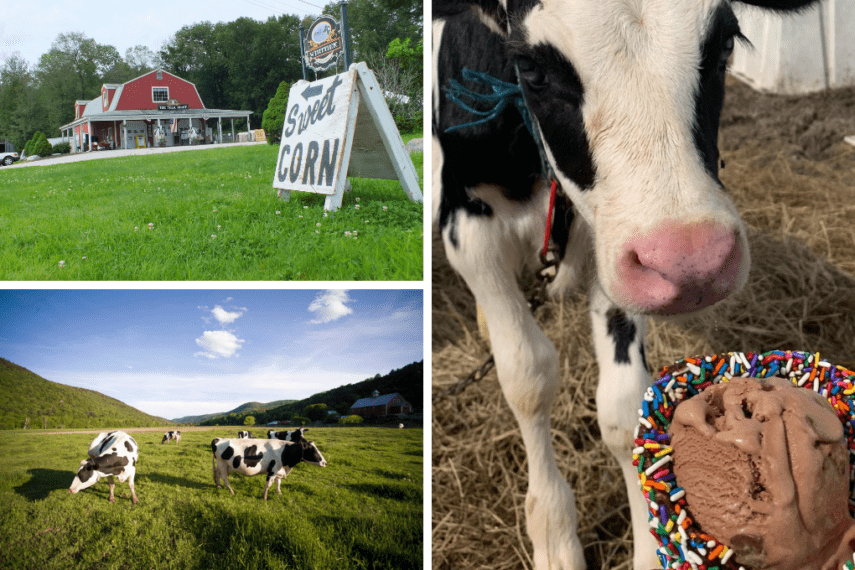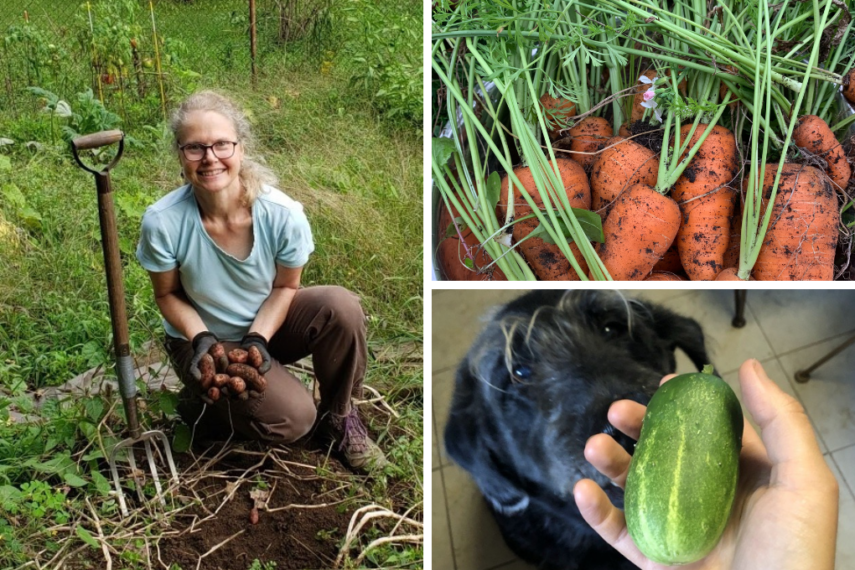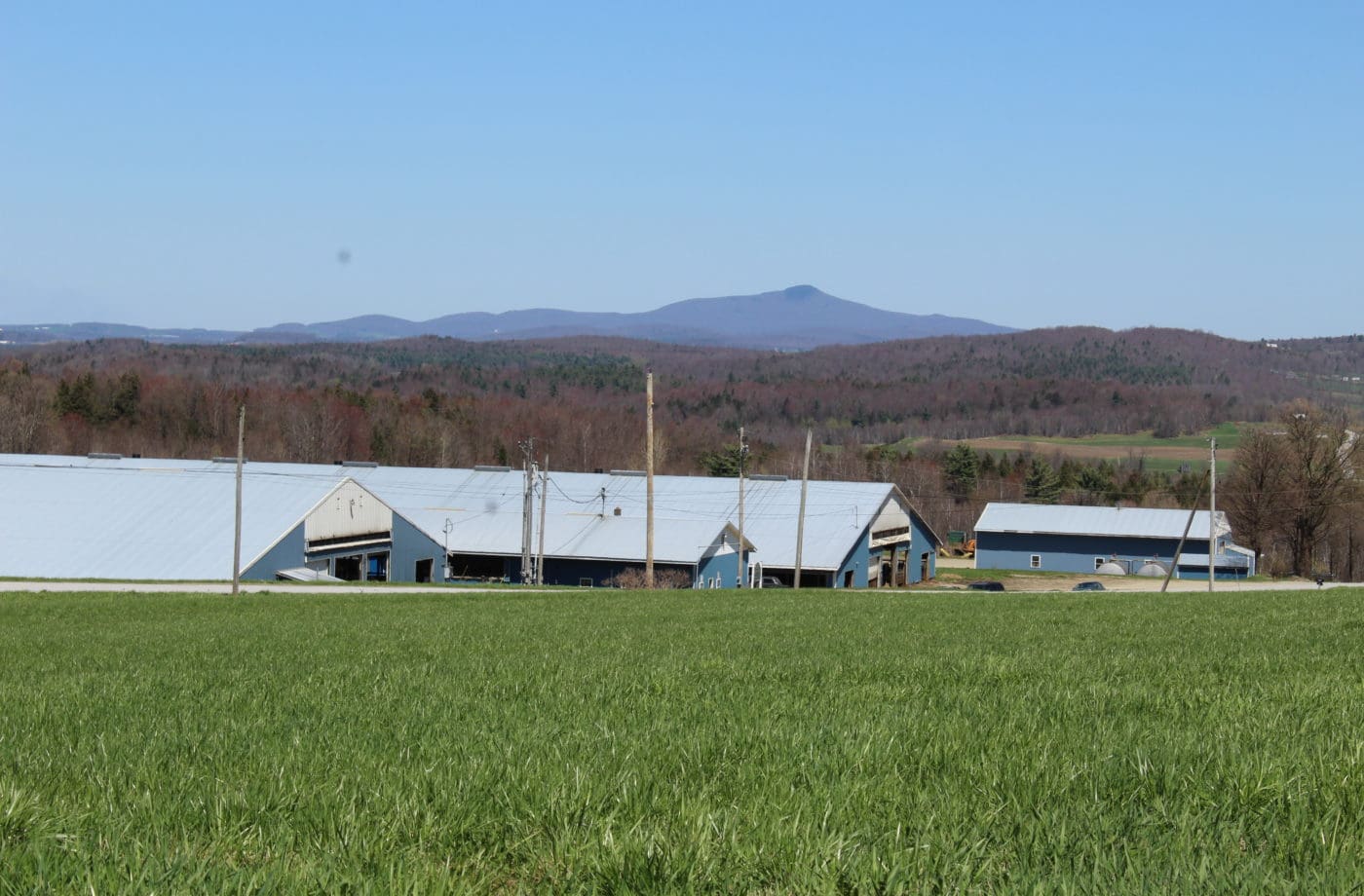
Though Earth Day this year is overshadowed by the greater issues we face…farmers continue to make food as an essential part of our infrastructure in a way that honors our natural resources. Without healthy land, air and water, dairy farmers couldn’t do the job they do.
When you include dairy in your diet, you’re choosing a sustainable food. You’re giving farmers in your region the ability to stay in business and to care for our natural resources. In this time of crisis, supporting our farmers is even more important.
The COVID-19 pandemic has reduced pollution all over the world…as we’ve hit the pause button on our commutes to work, plane trips across the country, and other unessential travel. It’s not surprising, considering transportation makes up 29% of U.S. greenhouse gas emissions, according to the EPA.
U.S. dairy accounts for 2% of overall U.S. greenhouse gas emissions. That is two-thirds less than it was 70 years ago.
Yet, there is more to do. Dairy farmers, co-operatives, brands and every part of the supply chain, of all sizes and types, are working to further reduce our collective carbon footprint together.
Two dairy farmers, one organic and one conventional, share below why sustainable food matters. And some of the challenges they face during the COVID-19 pandemic.
Both farms are members of Dairy Farmers of America. Dairy Farmers of America is a national, farmer-owned dairy cooperative focusing on quality, innovation and the future of family dairies.
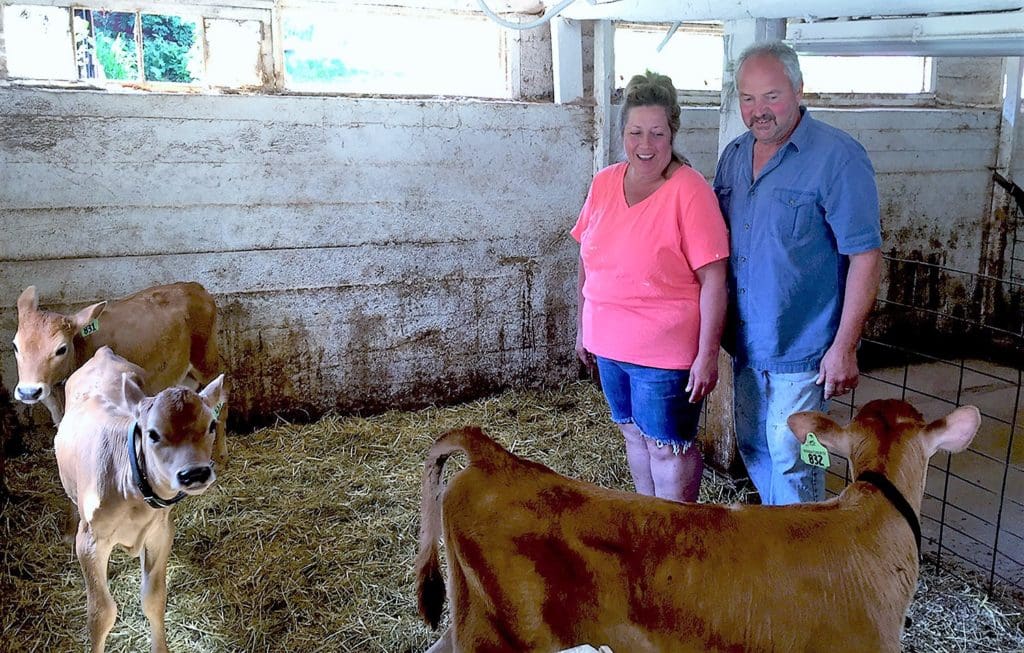
Rhonda Goodrich and her husband Myles.
Rhonda Goodrich, Molly Brook Farm, Cabot, VT
Myles Goodrich and his wife, Rhonda, own and operate Molly Brook Farm. The picturesque farm has been in the family for seven generations, since 1835. In 2015, Myles and Rhonda made the decision to transition their herd of Registered Jerseys and land to organic and they milk 70 cows. The farm’s resilience has relied on the ability to evolve with every new era in farming, for the better part of 200 years. Organic just made sense to Myles and Rhonda.
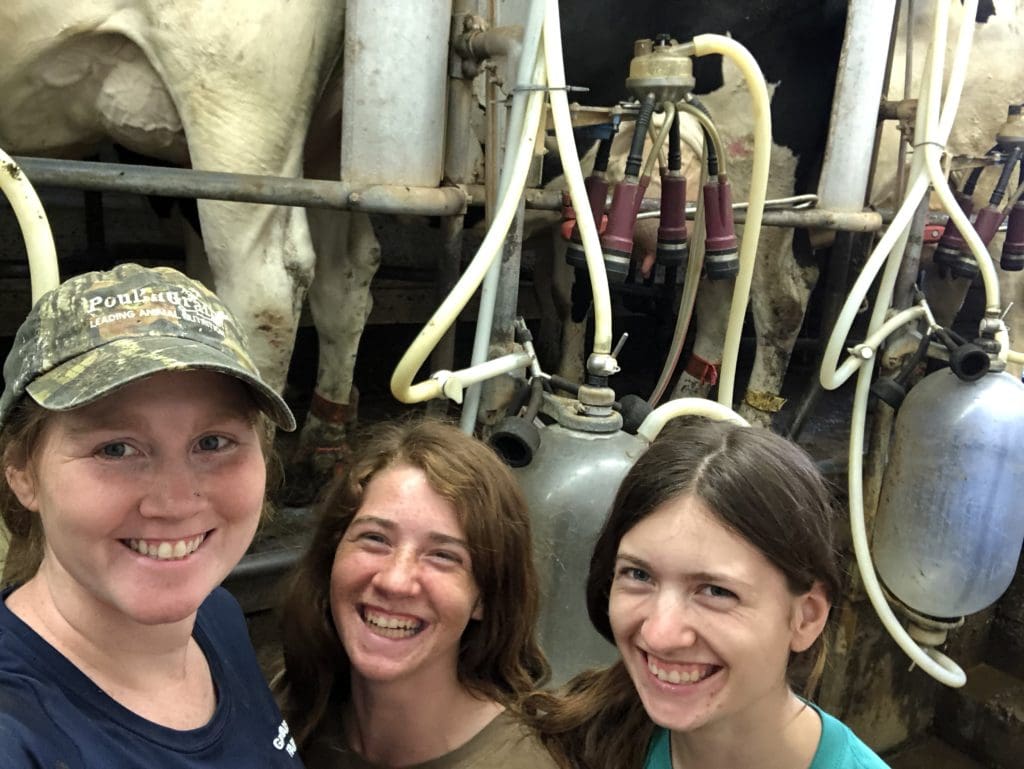
Left to right: Kati Lawyer-Hale and her sisters Selina Lawyer and Monica Lawyer.
Kati Lawyer-Hale, Gervais Family Farm, Enosburg Falls, VT
Robert and Gisele Gervais began Gervais Family Farm with about 35 milking cows in 1960. Three of their sons, Clement, Larry and Paul Gervais, and their grand-daughter Kati Lawyer-Hale – now co-own the farm. The past 60 years have brought many changes to the farm. As the family expanded, so did the operation, which now includes three farms: two Holstein dairy farms with a total 1,700-cow milking herd, and a goat and cow dairy with a farmstead cheese making operation and small retail store. Technology has evolved too….including a methane digester to make on-farm power from manure.
Q&A Session
Sustainability is a buzz word these days, what does the word mean to you?
Rhonda: Sustainability is a mindset and it is part of every decision we make on the farm. Our farm has been sustainable for over 200 years, and we need to make sure it is sustainable for the next generation. That means continued efforts to improve and promote the health of the Jersey breed through genetics, and that we continue to improve soil fertility and water quality. We also constantly think about the workplace environment. We want to make sure that it’s inclusive, and that everyone knows how their efforts impact the farm and the farm’s goals.
Kati: Sustainability is how we look at the farm as the whole. It’s the business, our employees, and the environment because it’s all interconnected. If our labor isn’t cost effective or our employees don’t feel valued, and we go out of business, that is not sustainable. If our fields are not producing quality feed for our cows, that is not sustainable. Sustainability is about continuing the farm for future generations. We want to leave the business in a better position than when we acquired it.
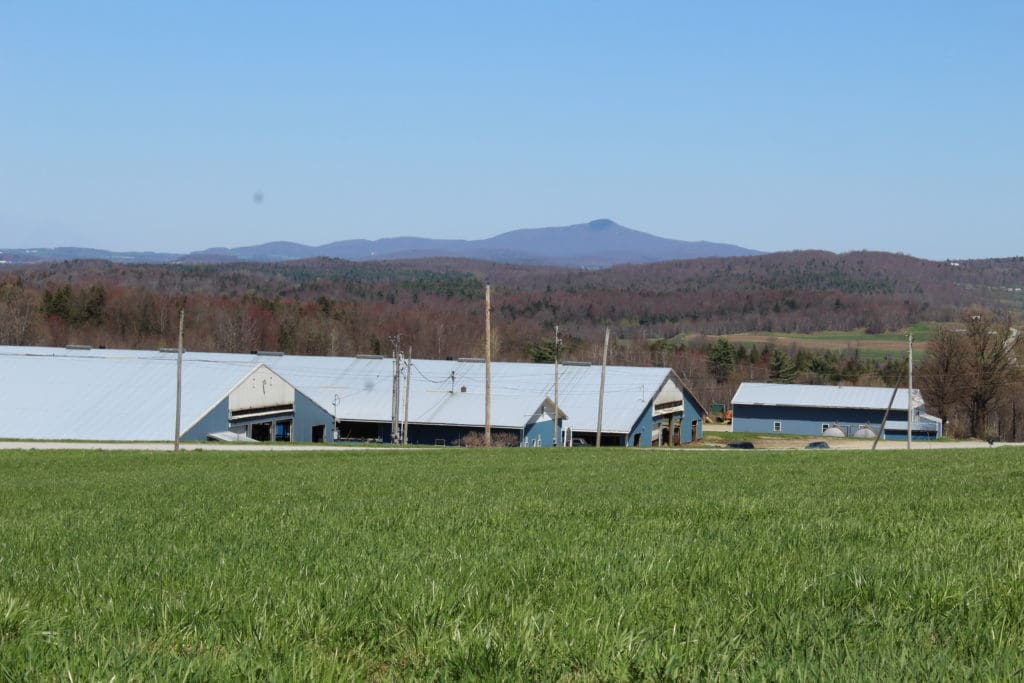
Gervais Family Farm, Enosburg Falls, Vermont
What practices have made the biggest impact in a positive way on the environment and your farm?
Rhonda: We manage 230 acres of pasture and crop land. Conservation practices have changed over the years but most significant was reseeding 53 acres of contour corn ground to perennial grass using a no-till seed drill in 2016. The perennial grass has further reduced soil erosion and improved water quality.
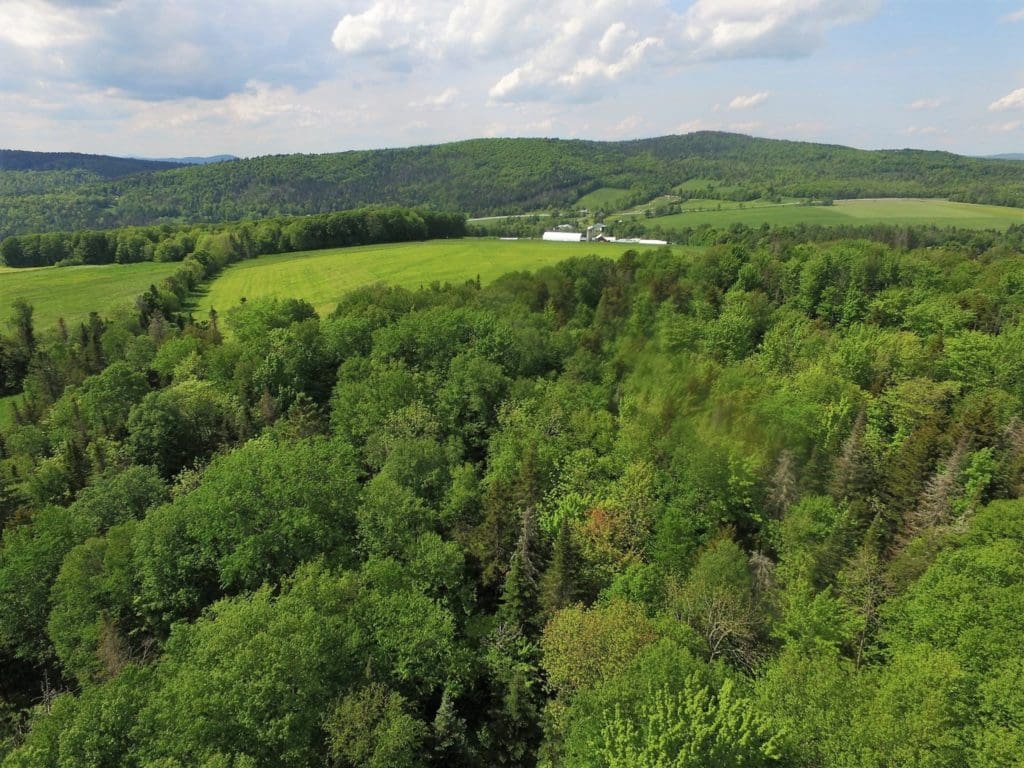
Molly Brook Farm, Cabot, Vermont
Transitioning the farm to become certified organic enabled us to significantly downsize the herd from 120 milking cows to 70 milking cows. The milking cows and young stock graze 86 acres of pasture. During the grazing season the cows harvest their own feed and fertilize the pasture reducing diesel fuel use. For each cut of hay, we drove the tractor over each acre 5 times (cutting, tedding, raking, chopping or baling, and fertilizing). If you think about 4 harvests a season that is 20 trips the tractor made over each acre that is now pasture. The milking cows average 3 acres per cow which greatly reduces their impact to our facilities and our land.
We also have 349 acres of forest that is managed by a forester to help us offset our carbon footprint. It is important to manage our natural resources thoughtfully and efficiently.
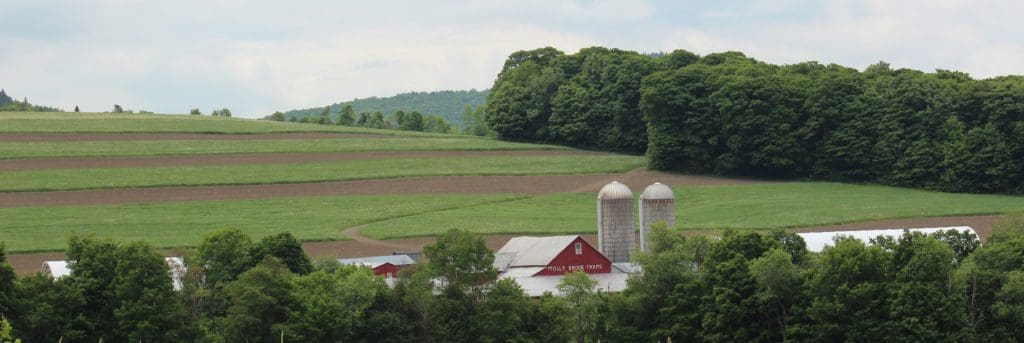
Cabot, Vermont
Kati: Our farm maintains roughly 3,000 acres of land. Eighty percent of that acreage is cropped using a no-till method, meaning the soil is kept intact and not tilled during planting. Carbon emissions and fuel usage decrease with no-till planting because we aren’t using our equipment as often.
We use liquid manure to fertilize our fields. Instead of trucking much of our manure, we pipe it through a dragline to the field. There’s not as much compaction on soil from equipment, and we reduce carbon emissions.
We also plant a cover crop on more than 90 percent of our land in the fall after the corn is harvested, which keeps a growing plant in the soil year-round to absorb excess moisture and soak-up important nutrients like phosphorous. Carbon is also removed from the atmosphere by cover crops, offsetting emissions. If cover cropped farmland increases to the highest possible acreage in Vermont, UVM Extension has told us that farmers could offset emissions for up to 51,000 cars.
Our methane digester has made a big difference for us too. We generate enough power from cow manure to make electricity for our farm and the equivalent of 350 to 400 homes per year.
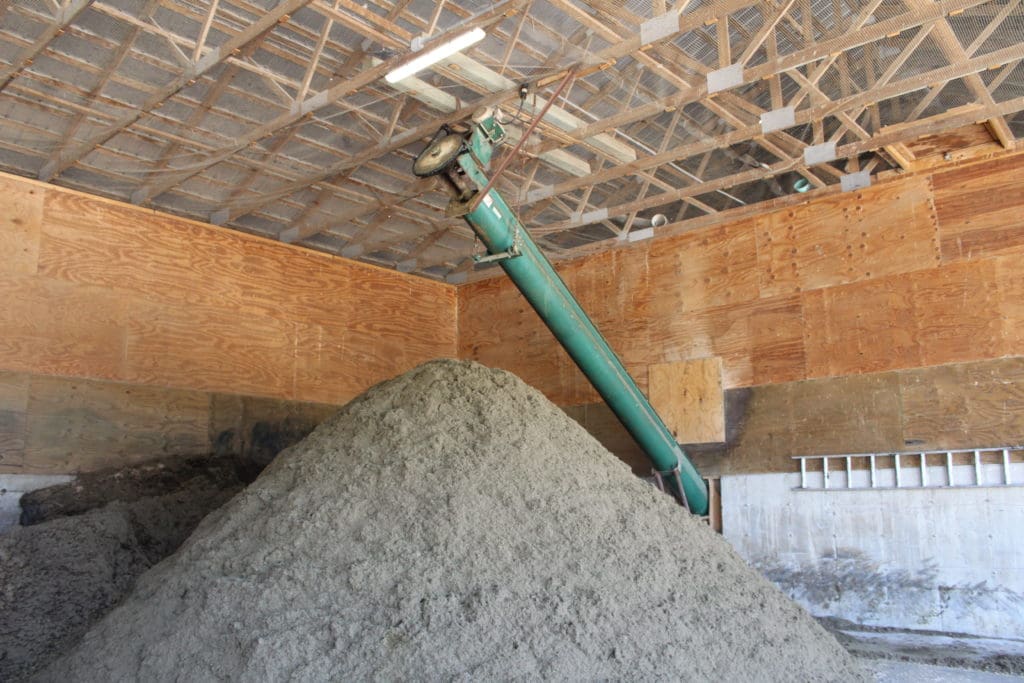
A byproduct of the methane digester is sterile plant fibers that are separated and used as bedding for the cows at Gervais Family Farm.
In this time of crisis, farmers now more than ever are playing an essential role in feeding people. What opportunities and challenges do you see now? Is there anything you want people to know?
Rhonda: The opportunities to continue to educate people about dairy farming and where their milk comes from still exist. It is so important that families and children continue to learn about and understand where their food comes from. It is rewarding when people appreciate how hard farmers work to feed people.
The registered Jerseys at Molly Brook have been on the farm since 1917. Each cow has a name and personality. Myles father, Walter Goodrich, always joked nobody ever made enough money to leave but in truth it is a love of the land and animals that keep a family in one place for almost 200 years.
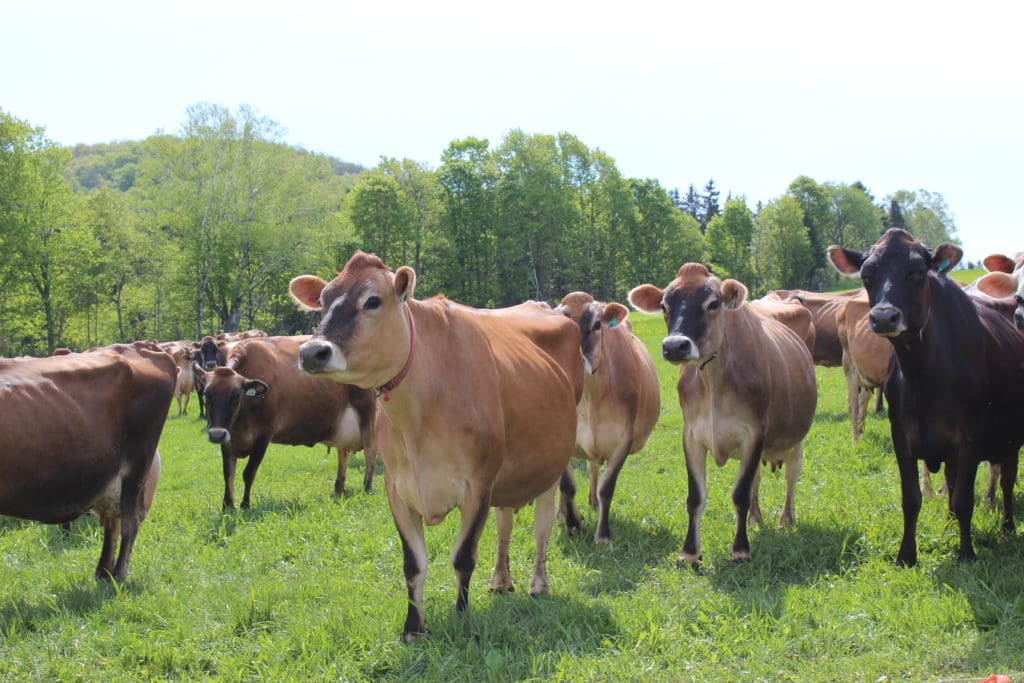
The Jersey family at Molly Brook Farm in Cabot, Vermont
Kati: The first thing I want people to know is that we’re still caring for the cows in the same way and we’re not cutting corners to get the job done. The cows are still getting best possible care.
There are challenges on the farm with not being able to have in-person meetings to communicate with our team. Like everyone else, it’s hard on people because they’re feeling isolated.
Other challenges are when you go into a store and the shelves for milk are empty. At the same time, we are being asked to dump milk because the dairy industry hasn’t been able to transition our products quickly enough from restaurants and schools to grocery stores. I want people to know there’s plenty of food in our country. It’s just the logistics of getting it there that are still catching up.
Farmers are essential and they are still operating to make sustainable food during this difficult time. I’m seeing that more people are recognizing the importance of farming. More people are gardening and growing their own food.
I think we’ll start to have an evolution of the way people think about our food system. More people are realizing where food is coming from and how important it is to support sources of sustainable food.
Whether organic or conventional, making sustainable food is a top priority for all farmers. Feeding the world is a complicated task and both farming methods are important for a sustainable food system. To learn more about how dairy farmers are working to make the world greener, visit our sustainability page.

